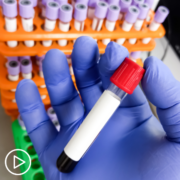Myeloma Symptom Management | An Expert’s Approach
Myeloma Symptom Management | An Expert’s Approach from Patient Empowerment Network on Vimeo.
How are myeloma symptoms and treatment side effects managed? Dr. Sikander Ailawadhi discusses the importance of addressing symptoms, management approaches, and the necessity of communication between the patient and their healthcare team to ensure optimal care.
Dr. Sikander Ailawadhi is a hematologist and oncologist specializing in myeloma at Mayo Clinic in Jacksonville, Florida. Learn more about Dr. Ailawadhi.
Related Resources:

|

Key Advice for Myeloma Patients | Questions to Ask About a Care Plan |

Available Myeloma Treatment Options for Patients | An Overview |
Transcript:
Katherine:
So, the symptoms of myeloma, as well as the side effects of certain medications, can vary greatly among those being treated. How do you approach symptom management with your patients?
Dr. Ailawadhi:
It is extremely important that we focus on the symptoms, whether it’s coming from the disease or it’s coming from the treatment. Because frankly, if a person is responding to the treatment, you want them to stay on the treatment for a longer duration of time, so the disease can stay controlled. If we don’t handle the symptoms from the treatment or the side effects that are happening or if the disease is causing too many symptoms, it is more likely that either we’ll start cutting down the drug too much or stopping the treatment, et cetera, and then the disease just comes back. In some cases, that is necessary, but generally we would like to modulate the treatment or address the symptoms.
So, one important piece that we should do, or at least we try to do over here, is that every single time that we talk to the patient for any of the visits – while there is enough time spent on, “Well, these are your labs, your diseases responding markers, SPEP, and M spike, and light chain,” and all that stuff – we spend a lot of time asking about symptoms.
It is, I understand, challenging to cover everything, but to familiarize what drugs cause what kind of symptoms, and at least making sure that we ask those from the patient. For example, IMiDs like lenalidomide (Revlimid) can cause some diarrhea, can cause fatigue, can cause sleepiness. Well, I must ask about diarrhea from all my lenalidomide patients.
Bortezomib (Velcade) can cause neuropathy. It can give rise to shingles. I must ask my patients for every bortezomib-treated patient. “Hey, do you have any neuropathy numbness, or tingling?
Are you taking your medication to prevent shingles, et cetera?” I’m just saying we may not be able to do a comprehensive review of every single symptom from every single patient, but whatever the target side effects are important to know every single time. We educate the patients about these side effects so that they are aware of them, and they can report these side effects. And then, if the side effects are happening, any symptoms are happening, then is it to the point that we need to stop the treatment?
Frequently, we do take drug holidays for a few weeks just to make sure, okay, we know is it coming from the drug or the disease? And every now and then, we realize, well, the drug was not even causing the symptom, because we stopped it, and the symptom stayed. Or so then, why stop the drug? There’s no point stopping it if I can’t control the symptom.
So, understanding whether it’s coming from disease or drug or something else, addressing them, making the changes appropriately to lower the dose, space them out, et cetera. All of that is done. And of course, like I said, importantly, educating the patient is so very important. I’ll add one quick thing. We focus on the drug-related effects.
As you rightly mentioned, Katherine, the disease itself can cause a lot of symptoms. So, generally, when I see a new myeloma patient, in the first couple of visits, we’ve done all the testing, we’ve discussed the treatment, and we’ve addressed some of the basic symptoms like pain, for example. That is big in myeloma.
But then, when the patient has started treatment, generally within the first two months, the focus that our clinic has is we need to control any side effects, and we need to address any symptoms that are being left over from the disease. And that’s when we start referring patients to interventional radiology for any bone procedures or palliative care for pain control or neurology for neuropathy, whatever so that we are controlling all the symptoms.
And that’s when we hopefully get the patient as close to their baseline as possible.









